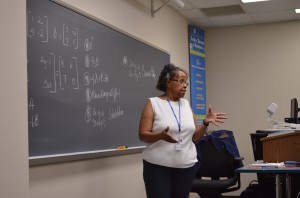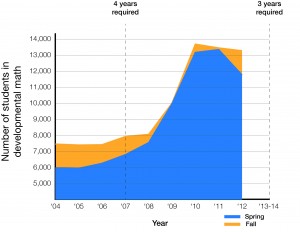By Matt Fulkerson/sports editor

In 2007, the Texas Legislature passed requirements for high school students that required four years of math, science, English and history.
Despite these changes, South Campus math department chair Catherine Haley said students still struggle to meet the TSI requirements for college-level math courses.
“Since we started the new test last August, we’ve had over 1,000 students take the test,” she said. “Less than 20 percent of those have placed into college math and almost 30 percent are placing below developmental math and need to take adult basic education courses.”
The state Legislature last year passed House Bill 5, a sweeping overhaul of the current graduation requirements in the state.
A number of students will now take only three years of math, science and social studies instead of four.
While the changes provide new guidelines for public schools, they will also impact community college students. Without an introduction to Algebra II, students will most likely be required to complete developmental math courses before registering for college-level math courses — a requirement for most associate degrees.
Not only could this raise the cost of school for students, it will require additional classwork before graduation.
Pushing for education reform
Director of the Senate Education Committee Marian Wallace said several issues drove the changes made in HB 5.
“We heard from businesses across the state that students were not prepared for the workforce,” she said. “The old requirements prepared them for college and higher education, specifically four-year degrees, but not to enter the workforce.”
By lowering the requirements for subjects such as science, math and social studies, students would have more time to focus on vocational and technical courses, she said.
“These courses would provide students with a variety of choices that will still expose them to critical thinking,” Wallace said.
Led by the Texas Chemical Council, the Jobs for Texas Coalition — a lobby group that represents 22 trade associations and a third of the workers in the state — took the lead in pushing for the reforms outlined in the bill, she said.
Mike Meroney with the Texas Chemical Council is the spokesman for Jobs for Texas and worked with the Legislature to outline the changes the group sees as necessary to keep Texas competitive.
“We kept hearing more and more complaints about shortages in skilled jobs that don’t require a four-year degree,” he said. “These aren’t blue-collar jobs but highly trained advanced positions that require certificates or associate degrees.”
Meroney said he envisions high schools and community colleges partnering to offer new and innovative programs that will help students prepare for these positions.
Prior to testifying before the Legislature, Jobs for Texas spoke with two-year schools about the gaps in training, he said.
“The first thing we did was talk to community colleges and said we needed more skilled laborers,” Meroney said. “We were told that they have the capacity and the programs but just needed the students.”
The old guidelines de-emphasized vocational and career technical programs in favor of four-year college preparation, he said.
Stumbling block for many students
Perhaps the most controversial portion of HB 5 is the removal of Algebra II as a requirement for graduation.
“I’m not sure how Algebra II became the big issue out of this,” Meroney said. “We have always argued that Algebra II is not the only pathway to success and not the only way to teach critical thinking skills.”
The State Board of Education is working on two new courses that will replace Algebra II for students who opt to take the lower pathway to graduation, he said.
“The two courses, statistics and algebraic reasoning, will be aligned with TSI standards and will be applied courses,” Meroney said.
Haley agrees that these types of courses can teach students critical thinking skills.
“I would be OK with them replacing Algebra II with applied math courses and statistic courses as long as they are rigorous enough,” she said.
However, SE mathematics assistant professor Sharon Holmes said many new TCC students cannot pass the TSI Assessment in math even with the old requirements that included Algebra II.
“Most of the students who come from high school have to take at least one developmental math course,” she said.
While some of these students are returning to school after several years, many of them are fresh from high school, she said.
“In my opinion, they should be required to take math their senior year of high school,” Haley said. “When they lay out of math for a year, they have problems, no matter what level of math they’ve completed.”
The Office of Institutional Research, Planning and Effectiveness said 13,139 students were enrolled in developmental math courses during fall 2012 and 11,899 were enrolled in spring 2013.
With 46,750 students enrolled at TCC during that time, this means 28 percent of students were enrolled in one of these courses during the fall and 25 percent during the spring.
Attempting to verify the exact number of students that require developmental math courses at TCC is difficult, IRPE executive director Terri Day said.
“The TCCD/THECB rules as to when a student needs to take a specified developmental math course have changed a few times since 2010,” she said in an email. “Therefore, you aren’t comparing apples to apples if you look at who was required to take developmental math as the requirements haven’t been stable.”
While developmental classes prepare students for college-level courses, they do not receive a credit toward graduation upon completion.
Many incoming students still struggle with math, and specifically algebra, at the college level, Holmes said.
“High school teachers have to teach to the exam, but what’s required for high school is different than what we require on our entrance exams,” she said.
One of the ways TCC is working to address that issue is by partnering with school districts to define a curriculum that not only meets the state’s guidelines but prepares them for credit classes, Holmes said.
“We’re working with Mansfield ISD, and they are looking to make changes in their curriculum so that students don’t have to go into remedial math programs when they arrive here,” she said.
Another way community colleges are driving toward student success includes the New Mathways Project, a partnership between the UT Dana Center and Texas Community College Teachers Association, the largest organization of post-secondary educators in the state. The purpose of the program is to develop multiple pathways for relevant math content aligned to specific fields of study, TCCTA executive director Richard Moore said.
“If these new guidelines [in HB 5] are part of a broader agenda that makes skilled jobs available and so that these vocational tracks lead to a middle-class lifestyle, Texas could be very competitive,” he said.
However, if the changes outlined in the bill are not paired with intentional efforts to connect those pathways to specific careers, students will suffer once they move into the job market, Moore said.
Another issue that he said the state and school districts need to consider is the possible restrictions it may place on some students.
“If students begin taking this lower-tier path and decide later that they do want to go to a four-year school, they may not be able to switch paths,” he said. “I think this needs to be factored into any state or local ISD’s plan.”
Math in the real world
South student Jeff Siler owns and operates Willow Park Air in Fort Worth and sees algebra and math as a key part of his work.
“It’s not something I use on every job, but it’s still a necessary part of what we do,” he said. “From conversions of Celsius to Fahrenheit and watts to amps, there is a lot of math and a lot of formulas to understand.”
Some programs, such as a heating, ventilation and air conditioning technician certificate, don’t require college-level math courses for completion at TCC. However, an associate degree in the field does.
Although HVAC technicians make a nice income and will always have work, they may have problems starting their own businesses without an understanding of math concepts, he said.
“I’ve seen a lot of guys that have been doing this for 20 years, making $15-25 an hour, and they just can’t get ahead,” Siler said.
While college math may not be a requirement for an HVAC technician certificate, TCC has incorporated a required applied math course to the program, South Campus heating, air conditioning and refrigeration technology instructor Andy Rhinefort said.
“We saw that a lot of students had a disconnect with basic math skills,” he said. “We built an applied course from the ground up that met our needs. It’s a technical course that they don’t receive a math credit for, but it’s a required part of the program.”
While people may disagree about HB 5, the importance of math and the role community colleges play in developing a well-rounded workforce is not under dispute.
If math courses geared toward specific career paths are developed, such as the one created for the HVAC program at TCC, they could provide students with an education and understanding that directly impacts their career field.
However, if these career paths are made obsolete by changes in technology or other unforeseen changes, workers may find themselves unable to adapt to a changing workforce.
“There’s a logic to math that you don’t get in any other course,” Haley said. “From running a business to just understanding your paycheck, math is important.”


























